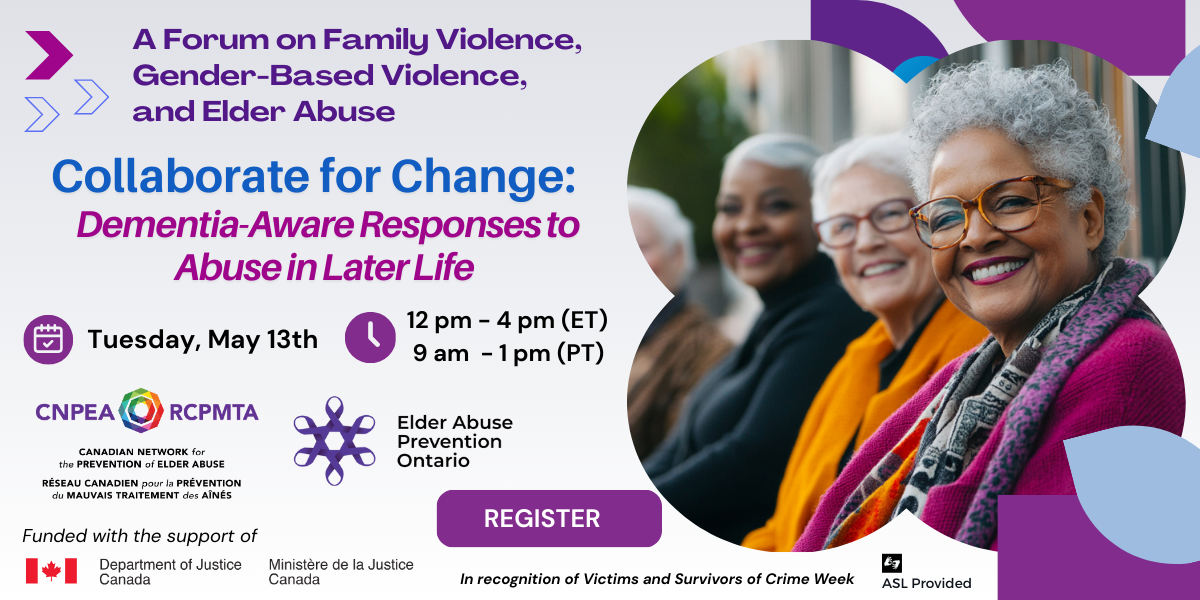
This event is held in recognition of Victims and Survivors of Crime Week
with the financial support of the Department of Justice Canada
Recordings and resources now available - See below:
About
On May 13, join CNPEA and EAPO for this online symposium focused on enhancing coordinated support of older victims of elder abuse, family violence, and gender-based violence, particularly when they are living with dementia or experiencing cognitive impairment.
Together, a series of speakers will examine challenges, recommended practices and possible solutions to provide better support to individuals and their families who experience abuse in the context of dementia. This symposium aims to:
- raise awareness of successful collaborative intervention team models across sectors to assist older adults who have experienced violence, abuse or neglect;
- illustrate the roles that support services and law enforcement can play in assisting older victims by being trained to detect ageism, avoid ableism, and understand seniors’ needs better;
- Examine best practices to provide safe, respectful, trauma -and violence- informed services and appropriate support.
This event will be of interest to both seniors’ service providers and professionals in the justice system.
INFOGRAPHICS
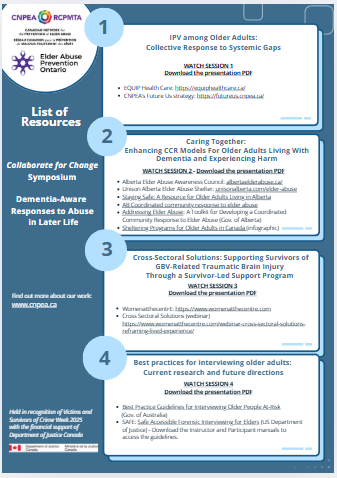
List of Resources
DOWNLOAD (English only)
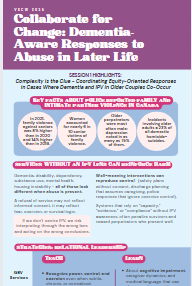 Highlights of Sessions / Leçons des sessions
Highlights of Sessions / Leçons des sessions
PROGRAMME AND SPEAKERS

Session 1: Collective Response to systemic gaps of IPV among Older Adults
12:15 PM – 12:45 PM Eastern
Margaret MacPherson, Research Associate, Centre for Research and Education on Violence Against Women and Children
Margaret designs and develops curriculum and related materials on a number of initiatives including the Make It Our Business workplace domestic violence program and It’s Not Right! Neighbours, Friends and Families for Older Adults. Margaret is passionate in her belief that everyone has an important contribution to make in creating safe and supportive environments at work and in our communities.
Summary: When ageism, intimate partner violence, and dementia converge in a family crisis, critical gaps in our systems of care, knowledge, protections, and accountability come into view. This complexity can also create space for more collective, coordinated responses that are grounded in the principles of equity-oriented and trauma- and violence-informed care. The presentation will explore key lines of inquiry and strategies for cross-sectoral leadership that centre safety, dignity, and relational accountability.
WATCH SESSION 1
Download the presentation PDF
Session 1 resources
- EQUIP Health Care : https://equiphealthcare.ca/
- Future Us: https://futureus.cnpea.ca/
Session 2: Caring Together: Enhancing CCR Models for Older Adults Living with Dementia and Experiencing Harm
12:45 PM – 1:45 PM Eastern
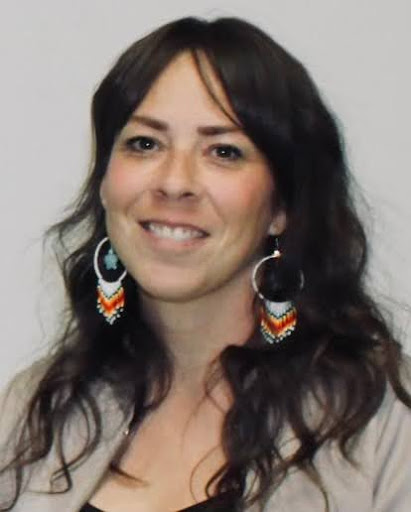 April Tucker, Indigenous Resource Liaison (South), Alberta Elder Abuse Awareness Council (A.E.A.A.C)
April Tucker, Indigenous Resource Liaison (South), Alberta Elder Abuse Awareness Council (A.E.A.A.C)
April is the Indigenous Liaison with The Alberta Elder Abuse Awareness Council (A.E.A.A.C), supporting case managers and service providers through Coordinated Community Response (CCR) or “Hubs” that address elder abuse and complex care needs. With over 25 years of experience in advocacy, frontline support, and system navigation, she brings a holistic, relationship-based approach to her work. April has worked across diverse communities, including extensive collaboration with Indigenous Nations, and is dedicated to ensuring that older adults are treated with dignity, respect, and care through coordinated, and culturally informed support systems.
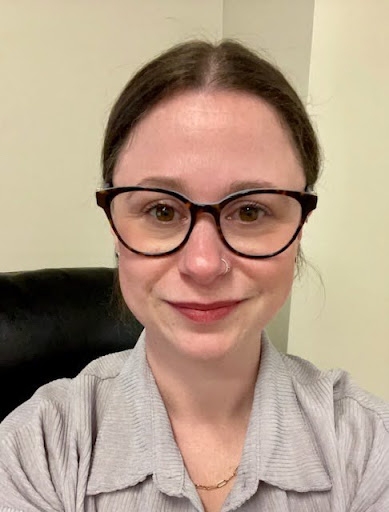 Meaghan Westlund, Team Leader for Outreach Services, Unison Alberta Elder Abuse Shelter
Meaghan Westlund, Team Leader for Outreach Services, Unison Alberta Elder Abuse Shelter
Meaghan supports older adults in the community after they experience abuse, coordinates and facilitates community presentations, spreading awareness about elder abuse and works within the Alberta Elder Abuse Awareness Council to network with professionals across the province. She is co-chair of the Co-ordinated Community Response, the Calgary Elder Abuse Awareness Collective and works with Calgary agencies to understand gaps in services and lend support to older adults. Meaghan is passionate about supporting those most vulnerable, understanding and overcoming barriers to do good and meaningful work in our community.
Summary: In this collaborative presentation, April and Meaghan will explore how Coordinated Community Response (CCR) models, or “Hubs,” are developed and sustained within both Indigenous and urban communities. The presentation will examine how these models differ from rural and urban CCR structures, emphasizing the importance of culturally grounded, holistic, and family centered approaches guided by the Nation as a whole. The discussion will highlight the strengths of community-led collaboration rooted in traditional values. An overview of Calgary’s urban CCR and its recent growth will be shared, including the role of multi agency partnerships and how these relationships help strengthen community-based support. A brief case study will demonstrate how a CCR approach could better support an older adult through coordinated care, and how urban CCRs can continue to expand by including organizations focused on cognitive health.
WATCH SESSION 2
Download the presentation PDF
Session 2 Resources:
- Alberta Elder Abuse Awareness Council: https://www.albertaelderabuse.ca/
- Unison Alberta Elder Abuse Shelter https://unisonalberta.com/elder-abuse
- Staying Safe: A Resource for Older Adults Living in Alberta: https://albertaelderabuse.ca/resources/staying-safe-a-resource-for-older-adults-living-in-alberta
- Sheltering Programs for Older Adults in Canada https://cnpea.ca/images/shelters_infographic_webfinal_2022.pdf
- Alberta’s coordinated community response model: https://cnpea.ca/images/_responseforelderabuse-factsheet-ab_2021.pdf
- Coordinated community response to elder abuse https://www.alberta.ca/coordinated-community-response-to-elder-abuse
- Addressing Elder Abuse: A Toolkit for Developing a Coordinated Community Response to Elder Abuse: https://open.alberta.ca/publications/addressing-elder-abuse-a-toolkit
Session 3: Cross-Sectoral Solutions: Supporting Survivors of Gender-Based Violence-Related Traumatic Brain Injury Through a Survivor-Led Support Program
1:45 PM – 2:45 PM Eastern
 Gifty Asare,
Gifty Asare,
PhD Director of Research and Community Impact,WomenatthecentrE
Gifty Asare is a Ghanaian Canadian researcher from Tiohtià:ke/Montreal and currently serves as the Director of Research and Community Impact at WomenatthecentrE, a nonprofit by and for survivors of gender-based violence (GBV). She holds a PhD in Psychology and Neuroscience from York University, with prior training in Psychiatry (McGill) and Neuroscience (Concordia), and her work centers on GBV, traumatic brain injury (TBI), and their impacts across the lifespan.
Summary: This presentation will highlight key insights from Cross-Sectoral Solutions: Strengthening Community Capacity to Address the ‘Parallel Pandemic’ of Gender-Based Violence-Related Traumatic Brain Injury Through a Survivor-Led Support Intervention, a national project led by WomenatthecentrE. Drawing on a lifecourse approach, Gifty Asare will explore the often-overlooked connection between gender-based violence (GBV) and traumatic brain injury (TBI), and how these injuries can compound cognitive challenges across the lifespan. The session will discuss survivor-informed strategies for cross-sector collaboration, with implications for elder abuse prevention, trauma-informed care, and supporting aging survivors of GBV who may also be experiencing the lifelong effects of TBI.
WATCH SESSION 3
Download the presentation PDF
Session 3 Resources:
- WomenatthecentrE: https://www.womenatthecentre.com
- Cross Sectoral Solutions: https://www.womenatthecentre.com/webinar-cross-sectoral-solutions-reframing-lived-experience/
Session 4 : 2:45 pm – 3:45 pm
Part 1- Law enforcement response and support for Older Adult victims of IPV
 Amanda Bitter, Detective Constable, Major Crimes Bureau, Intimate Partner Violence, York Regional Police
Amanda Bitter, Detective Constable, Major Crimes Bureau, Intimate Partner Violence, York Regional Police
Amanda has been a police officer with the York Regional Police Service for the past seventeen years. Amanda has spent the past four years in the Intimate Partner Violence Unit, and previously worked as a Senior Safety Officer, as well as a Mental Health Support Team Alternate. Amanda, originally from Thunder Bay, Ontario received her Police Foundations Diploma from Confederation College, and then obtained her BA in Psychology from Lakehead University. Amanda is passionate about elder abuse and continues to advocate for older adults.
Summary: Detective Constable Amanda Bitter will discuss the role of police in responding to violence against older adults and the complexities of IPV victims and accused, including dementia as a vulnerability and risk factor. Various case studies will be presented which will explore why an interdisciplinary approach is required to address the difficulties in navigating these intricate cases and intersectional issues.
Part 2 – Best practices for interviewing older adults with diverse backgrounds and needs: Current research and future directions
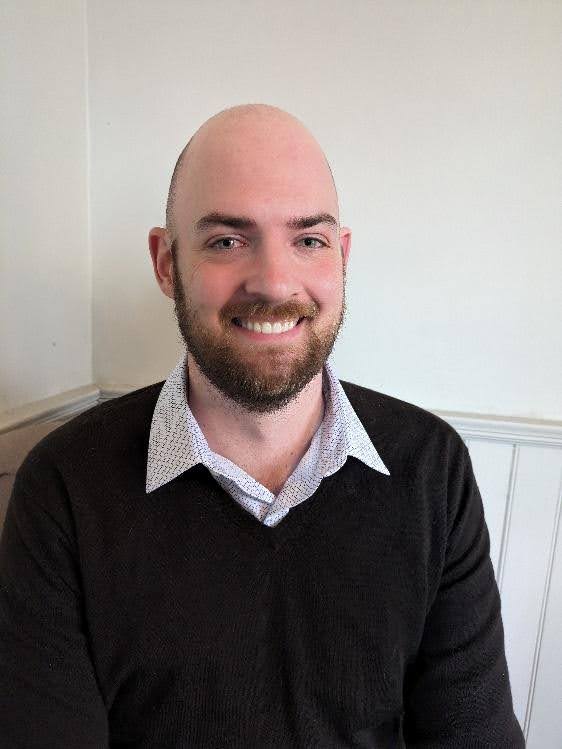 Josh Wyman, PhD
Josh Wyman, PhD
Assistant Professor, Department of Psychology, King’s University College at Western University
Dr. Joshua Wyman is an Assistant Professor at King’s University College at Western University. His research focuses on improving the best practice methods for interviewing older adults in criminal investigations. He is also completing research that explores older adult fraud victimization, prevention and intervention, as well as the prevention and reporting of older adult maltreatment in healthcare settings. Finally, Dr. Wyman is a licensed school and clinical psychologist in Ontario. In his role as a psychologist, he provides psychological assessment, treatment and consultation services to children, youth and parents in school and clinical settings.
Summary: Dr. Wyman will discuss the existing research on evidenced-based practices for interviewing older adult victims and witnesses. He will provide an overview of special considerations when interviewing older adults who have cognitive and physical-related challenges, including beneficial interviewing accommodations and supports. Furthermore, he will discuss recent research on the training needs of health and law enforcement professionals in Ontario for supporting older adults who are most at-risk of abuse, neglect and exploitation.
WATCH SESSION 4
Download the presentation PDF
Session 4 Resources:
Interview guidelines specific to older adults
- Government of Australia: Best Practice Guidelines for Interviewing Older People At-Risk- https://nsclegal.org.au/resources/best-practice-guidelines-for-interviewing-older-people-at-risk-2023/
- SAFE: Safe Accessible Forensic Interviewing for Elders- https://www.justice.gov/elderjustice/safe-training
You don't need to participate in the SAFE training to get access to the materials. Download the Instructor and Participant manuals to access the guidelines.
Interview guidelines for general adult populations
- P.E.A.C.E Model of Forensic Interviewing: https://www.fis-international.com/resources/
- Achieving Best Evidence in Criminal Proceedings (UK Interviewing Guidelines): https://www.gov.uk/government/publications/achieving-best-evidence-in-criminal-proceedings
















